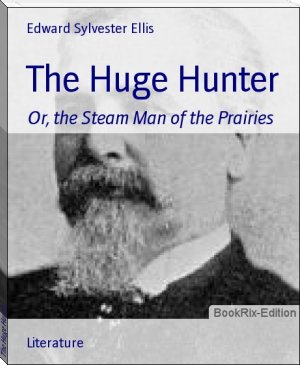The Life of Kit Carson: Hunter, Trapper, Guide, Indian Agent and Colonel U.S.A. by - (best motivational books to read TXT) 📗

- Author: -
Book online «The Life of Kit Carson: Hunter, Trapper, Guide, Indian Agent and Colonel U.S.A. by - (best motivational books to read TXT) 📗». Author -
After a full survey of the work before them, they concluded the task was beyond accomplishment. The magnificent force, therefore, began withdrawing. It was the turn of the trappers to feel disappointed. They had not thought of any such issue and were enraged. They shouted and made tantalizing gestures to the Blackfeet, in the hope of goading them to stand their ground, but they were too wise to do so. They retreated to a safe point where a council of war was held. It was not to be expected that after such an abrupt withdrawal, they could summon enough courage to make the assault.
When the conference was over, the Indian army, as it may be called, broke into two divisions, one of which went back toward their own village while the other set their faces toward the Crow country. Uncertain whether they would not reappear when they believed there was hope of surprising the mountaineers, the latter maintained their vigilance day and night.
It may have been that the red men made several reconnaissances, but, if so, they concluded it would be imprudent to attack the mountaineers who held their position and continued trapping as opportunity presented through the winter.
After trapping in various localities, Kit Carson and several friends visited Fort Hall, where they joined a party in the employ of the Northwest Fur Company. They trapped around the head of Salmon River and other streams, and finally returned to Fort Hall, where the peltries were sold for a fair valuation. Then Carson and a few others set out to join a party which he knew was trapping in the Blackfoot country. Upon coming up with them, he was told that they had had several sharp skirmishes with the Indians, in one of which a trapper was severely wounded. The following morning, Carson and his comrades parted from the rest and were trapping slowly up stream, when they were fired upon by Blackfeet and compelled to retreat. They hurried back and succeeded in escaping a serious danger; but the pursuit was so close that Carson hastily stationed his men in ambush. A hot fire dropped several of the warriors and caused the others to hesitate.
The halt was just long enough to allow the trappers to reload their pieces, when the Blackfeet made a fiercer rush than before; but with that pertinacious courage for which the tribe is noted, they kept up the fight through the rest of the day, determined to throw away no advantage they might gain. Had Carson chosen his position with less judgment, he and his command must have been overwhelmed, for nothing could have exceeded the daring of their assailants, who in their desperation set fire to the thicket in which the mountaineers had ensconced themselves; but the shrubbery was too green to burn well, and, after a little while, it died out. Then it must have been the red men concluded it was useless to strive further, and, learning that the main body of the trappers were not far off, they departed.
The annoyance from these Indians was so great that it was decided to leave the country. While the trappers were able to hold their own against them, yet it was impossible to make much progress in taking furs, when their attention was mainly taken up in fighting the warriors, who varied their shooting by destroying the traps that were set for the beavers.
The next scene of operations was the North Fork of the Missouri where they had been engaged only a short time when they came upon an extensive village of Flathead Indians. These showed their friendliness to the trappers by sending one of their chiefs and a number of warriors who helped them hunt along the different streams.
The following spring Carson and a single companion set their traps in the vicinity of Big Snake River. This was the country of the Utah Indians, who were well disposed towards the whites. Thus, while furs were plenty, the couple were enabled to devote their whole time to taking them, without fear of being fired upon every time they ventured out of sight of camp. As a consequence, they succeeded beyond their own expectations, and, making their way to the nearest post, sold the stock for a fair sum.
The peltries were scarcely disposed of, when Carson organized another expedition which visited the Grand River, over which they trapped until winter, when they returned to Brown's Hole, where Carson remained until spring. Then he trapped once more in the land of the Utahs and at New Park, taking their furs to the post where he was obliged to sell them for a much less sum than he had ever received before.
The transaction had an important bearing on the fortunes of Kit Carson, for it was proof of an unpleasant truth that had been forcing itself for a number of months upon him: the days of remunerative trapping were ended.
For years, the demand had been growing steadily less both in Europe and America. The ingenuity of the manufacturer showed itself in the make of cheaper substitutes, while the beavers that had been hunted so persistently were becoming scarce: there were few regions in which trapping could be pursued with any success.
Nothing could be plainer, therefore, to Carson than the fact that he must soon give up the business and engage in something else to gain a livelihood. What should it be?
Carson and several veteran trappers started for Bent's Fort, located on the Arkansas, near an immense forest of cottonwoods, known as the Big Timbers. Messrs. Bent and St. Vrain, the proprietors, no sooner learned that Carson contemplated a change of occupation, than they offered him the position of hunter for the fort, his duties being to keep it supplied with all the game that was required.
Carson was more willing to accept the offer than he would have been under other circumstances. He agreed that the large number of men should never want for animal food, and, having given his promise, he kept it most faithfully for a period of eight years.
This statement includes a great deal, for it means that his wonderful rifle brought down thousands of deer, antelope, elk and bisons; that he tramped over hundreds of leagues of wilderness; that his splendid health never failed him, and that his knowledge of the woods and its inhabitants was as full and complete as it could be.
Furthermore, it is stated by Dr. Peters, that during that entire period, not a single impatient word passed between Carson and his employers. He attended to his duties with such regularity, promptness and skill that the only comments they could make on his work were in the nature of strong compliments.
Inasmuch as we have claimed that Carson was the superior in every respect of those with whom he was associated, we must dwell for a moment on this fact. Let the reader ask himself how many cases he knows where the term of service has been so long, in which not a single unkind word has passed between employer and employee.
His occupation as hunter was not monotonous, for where there were so many to provide for, difficult and dangerous work was required and the journeys which he often made through the long stretches of wilderness were sometimes attended with much personal danger.
But the surrounding tribes, including the Arapahoes, Kiowas, Cheyennes, Comanches and others, looked upon the great hunter with affectionate admiration and no guest was more welcome and honored in their lodges than he.





Comments (0)